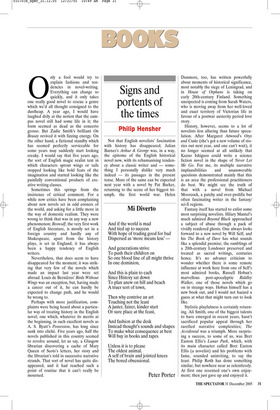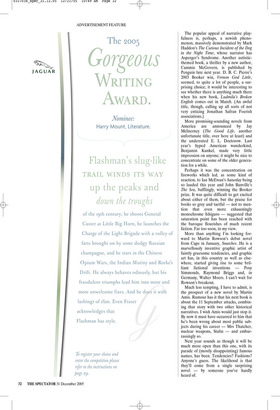Signs and portents of the times
Philip Hensher
Only a fool would try to explain fashions and tendencies in novel-writing. Everything can change so quickly, and it only takes one really good novel to rescue a genre which weŌĆÖd all thought consigned to the dustheap. A year ago, I would have laughed drily at the notion that the campus novel still had some life in it; the form seemed as dead as the concerto grosso. But Zadie SmithŌĆÖs brilliant On Beauty revived it with fizzing energy. On the other hand, a fictional standby which has seemed perfectly serviceable for some years may suddenly start looking creaky. I would say that five years ago, the sort of English magic realist text in which characters sprout wings or tails stopped looking like bold feats of the imagination and started looking like the painfully conventional products of creative writing classes.
Sometimes this springs from the insistence of critical comment. For a while now critics have been complaining about new novels set in odd corners of the world, and asking for a little more in the way of domestic realism. They were wrong to think that was in any way a new phenomenon; Beowulf, the very first work of English literature, is mostly set in a foreign country and hardly any of Shakespeare, apart from the history plays, is set in England; it has always been a happy tendency of English writers.
Nevertheless, that does seem to have disappeared for the moment; it was striking that very few of the novels which made an impact last year were set abroad. Louis de Berni├©resŌĆÖ Birds Without Wings was an exception, but, having made a career out of it, he can hardly be expected to change path, and he would be wrong to.
Perhaps with more justification, complaints were being heard about a particular way of treating history in the English novel; one which, whatever its merits at the beginning, in such excellent novels as A. S. ByattŌĆÖs Possession, has long since sunk into clich├®. Five years ago, half the novels published in this country seemed to revolve around, let us say, a Glasgow librarian discovering a cache of Mary Queen of ScotsŌĆÖs letters, her story and the librarianŌĆÖs told in successive narrative strands. That sort of novel has quite disappeared, and it had reached such a point of routine that it canŌĆÖt really be mourned. Not that English novelistsŌĆÖ fascination with history has disappeared; Julian BarnesŌĆÖs Arthur & George was, in a way, the epitome of the English historical novel now, with its rehumanising tendency about a classic writer and ŌĆö something I personally dislike very much indeed ŌĆö its passages in the present tense. More of the same can be expected next year with a novel by Pat Barker, returning to the scene of her biggest triumph, the first world war. Helen Dunmore, too, has written powerfully about moments of historical significance, most notably the siege of Leningrad, and in House of Orphans is taking on early 20th-century Finland. Something unexpected is coming from Sarah Waters, who is moving away from her well-loved and exact territory of Victorian life in favour of a postwar austerity period love story.
History, however, seems to a lot of novelists less alluring than future speculation. After Margaret AtwoodŌĆÖs Oryx and Crake (sheŌĆÖs got a new volume of stories out next year, and one canŌĆÖt wait), it no longer seemed at all unlikely that Kazuo Ishiguro could write a science fiction novel in the shape of Never Let Me Go. For me, its multiple narrative implausibilities and unanswerable questions demonstrated mainly that this is an area the professional practitioners do best. We might see the truth of that with a novel from Michael Moorcock, a patchy and over-prolific but often fascinating writer in the fantasy/ sci-fi regions.
Fantasy itself has started to enlist some most surprising novelists. Hilary MantelŌĆÖs much admired Beyond Black approached a subject of abuse through a pack of vividly rendered ghosts. One always looks forward to a new novel by Will Self, and his The Book of Dave has what sounds like a splendid premise; the ramblings of a 20th-century Londoner preserved and treated as sacred writings, centuries hence. ItŌĆÖs no advance criticism to wonder whether there is some remote influence at work here from one of SelfŌĆÖs most admired books, Russell HobanŌĆÖs marvellous post-apocalyptic Riddley Walker, one of those novels which go on in strange ways. Hoban himself has a new book out, and I would not hazard a guess at what that might turn out to look like.
Stylistic playfulness is certainly returning. Ali Smith, one of the biggest talents to have emerged in recent years, hasnŌĆÖt sacrificed popular appeal through her rarefied narrative complexities; The Accidental was a triumph. More surprising a success, to some of us, was Bret Easton EllisŌĆÖs Lunar Park, which, with its main character called Bret Easton Ellis (a novelist) and his problems with fame, sounded uninviting, to say the least. Philip Roth has done something similar, but nowhere near as relentlessly. At first one resented oneŌĆÖs own enjoyment; then just gave up and enjoyed it. The popular appeal of narrative playfulness is, perhaps, a newish phenomenon, massively demonstrated by Mark HaddonŌĆÖs The Curious Incident of the Dog in the Night Time, whose narrator has AspergerŌĆÖs Syndrome. Another autisticthemed book, a thriller by a new author, Cammie McGovern, is published by Penguin late next year. D. B. C. PierreŌĆÖs 2003 Booker win, Vernon God Little, seemed, to quite a lot of people, a surprising choice; it would be interesting to see whether there is anything much there when his new book, LudmilaŌĆÖs Broken English comes out in March. (An awful title, though, calling up all sorts of not very enticing Jonathan Safran Foerish associations.) More promising-sounding novels from America are announced by Jay McInerney (The Good Life, another unfortunate title, over here at least) and the underrated E. L. Doctorow. Last yearŌĆÖs hyped American wunderkind, Benjamin Kunkel, made very little impression on anyone; it might be nice to concentrate on some of the older generation for a while.
Perhaps it was the concentration on fireworks which led, as some kind of reaction, to Ian McEwanŌĆÖs Saturday being so lauded this year and John BanvilleŌĆÖs The Sea, bafflingly, winning the Booker prize. It was quite difficult to get excited about either of them, but the praise for books so grey and tactful ŌĆö not to mention that even more exhaustingly monochrome Ishiguro ŌĆö suggested that saturation point has been reached with the baroque flourishes of much recent fiction. Far too soon, in my view.
More than anything IŌĆÖm looking forward to Martin RowsonŌĆÖs debut novel from Cape in January, Snatches. He is a marvellously inventive graphic artist of faintly gruesome tendencies, and graphic art has, in this country as well as elsewhere, started giving rise to some brilliant fictional inventions ŌĆö Posy Simmonds, Raymond Briggs and, in Germany, Walter Moers. I canŌĆÖt wait for RowsonŌĆÖs breakout.
Much less tempting, I have to admit, is the prospect of a new novel by Martin Amis. Rumour has it that his next book is about the 11 September attacks, combining that story with two other historical narratives. I wish Amis would just stop it. By now it must have occurred to him that heŌĆÖs been wrong about most public subjects during his career ŌĆö Mrs Thatcher, nuclear weapons, Stalin ŌĆö and embarrassingly so.
Next year sounds as though it will be much more open than this one, with its parade of (mostly disappointing) famous names, has been. Tendencies? Fashions? AnyoneŌĆÖs guess. The likelihood is that theyŌĆÖll come from a single surprising novel ŌĆö by someone youŌĆÖve hardly heard of.


















































 Previous page
Previous page